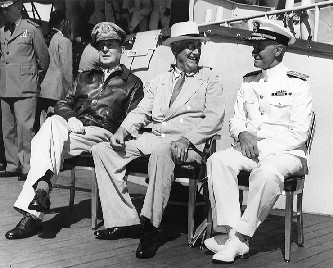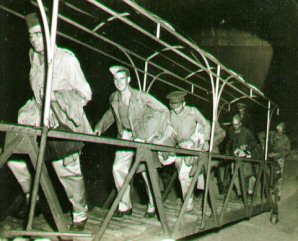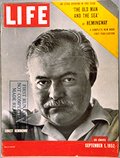|
Readers
Blast Tolerance; Pope "Serene"
Dateline: al-Palmer Park, Al-BurQuerque: The seven not-so-deadly Cids came together with a Muslim brother to discuss the virtues of tolerance, poetry, Jedda cookies, Berbers, and Bedouins in Y1K Spain. We learned the author, María Rosa Menocal, was born in Cuba and raised in New York. Her book is dedicated to her father, "the intrepid ... who has lived in lifelong exile from his own land of the palm trees." - certainly evocative of her description of Abd al-Rahman. We were honored to have as a guest at this meeting a friend of the host: Mamdouh Morsy Adbel-Gawad, a dermatologist who lives in Port Said and works in Cairo. Mamdouh is a serious student of Muslim history. He was most interested that we were reading a history of al-Andalus, and offered his insights during the discussion. General questions: Is it true that Islam has no icons? The crescent is a symbol, but - What about minarets? Is it true that Judaism has no (overall, Pope-like, or Caliph-like) leaders? Could the Patriarch of Jerusalem lead a military effort or call out Jews world-wide? We learned that the Jews were expelled from Spain in 1492, whereas (initially) the Moors only lost power - they could still worship as Muslims (this "guarantee" was later lost also). We found the members present held views on the book quite divergent from those expressed electronically by members who could not attend the meeting. Our views more closely agreed with those expressed by Harold Bloom (b: 1930), the outspoken Yale-based poetry guru, who wrote what must as a minimum be described as a most surprising Foreword to Menocal's book - a carefully worded left-handed compliment. The readers questioned how much of a history the book is - Bloom probably more acurately describes it as a love song addressed to the Jewish, Muslim, and Christian poets of what once we referred to as the High Middle Ages. Perhaps the most insightful theory on Menocal's book was offered by Ron B. in his summary remarks: |
| Ron:
I could find no critical reviews of the book on the Internet, which is
unfortunate. [Joel:
some editorial
reviews exist at Amazon.com; but for more critical, see these
reviews.] The book had a jarring
discontinuity with a 1382 - 1492 leap, when Ferdinand and Isabella
closed out the rule by Moors in Granada - what happened? Why was
this bloodless? I took the liberty to look up this history, and
found an interesting story of civil war within Granada, with an exile
who brought in guards from Alhambra - this missing piece made me
question the book overall. Theory:
The book
appears to be written by a group of, say, three grad students, each
writing a third. Some clues to support this theory: the
first third uses the term "polity" profusely, a term which disappears
in the second and third portions. The third section uses a
Question and Answer approach to the writing which is not used
elsewhere. This changing of writing styles was very distracting
to follow. This book was not ready for publication - a good
Editor would not have allowed it to be published, would have sent it
back - it appears to be slapped together, didn't flow between major
sections, and certainly omitted major historical events. Having said that, the subject matter was very interesting to me - I knew nothing about Spain. (I recommend the movie "Stealing Heaven" which is the story of Peter Abelard and Heloise, very good.) I did find the book interesting - the first half was tough going, then in the latter part I saw some names I knew, and I found it more interesting. I'll give it a B+ Keith: [by proxy from Ron]. I didn't enjoy it - rambling, polyanna-ish, conflicts with scholars. Grade: D The lady from Yale
( it was rumored that Keith read only the
first seventy pages)I fail. Joel: I was looking forward to reading the book until I started. The first third of the book took forever - and she left out stuff I thought was quite interesting - the book would have benefited from an editor, and from more pictures. The pictures in the book also appear to be the work of a grad student, armed with a darkly filtered Kodak Instamatic with only black and white film. ( I recently saw a show on travel to Santiago, where they cover the facade of a mosque with Arabic structure, then torch it.) As to the subculture expressed here, the tolerance was not that great - there was fighting going on - Grade: C+ Mike: I am quite relieved to realize that I was not the only one that was not impressed by the writing in this book. I considered giving up the meeting in favor of the basketball game tonight, not wanting to depress the discussion with my opinion. Ron's grad student theory works well for me. The writing was some of the more irritating I have encountered. I bogged down in the middle of this book, and prepared to quit - but went on to the back, as I wanted to read any stories of the 1492 expulsion of the Moors. There I found the Don Quixote segment, and other stories that saved the grade from my initial reaction of a D. I thought a better subtitle would have been: "How Muslins, Jews, and Christians Had No Chance to Maintain A Culture of Tolerance in Medieval Spain." The tolerance died on page 100 of the book, with the sack of Cordoba by the Berbers in 1013. Why didn't she explore the idea of why tolerance didn't stick? Why did the country disintegrate into taifas? Our USA has also enjoyed 250 years of religious tolerance - which is more impressive? Can you imagine our country disintegrating? I found a one page summary under Spain on the Internet that gave all the history that Menocal presented in this book - she provided very little detail and raised more questions than she attempted to answer. Why was Abd al-Rahman able to walk into Iberia and immediately be recognized as Caliph, to be declared over all of Spain in only five years? That is a big-time accomplishment - is there no history to explain that? Overall, I longed for the effective meat-and-potatoes-with-anecdotes historical approach of Stephen Ambrose. Menocal tried to be "cutesy" to push her themes (e.g., it is manly to be a poet!). She wandered around the time period and chose some incidents to support her love story. She left out many harsh realities, e.g.: The Pope was requested by Ferdinand and Isabella to sanctify the Spanish Inquisition in 1482 against the Jews. Grade: C+ Don: <First, a request to Gary: don't publish your review until everyone has read the book!> I was anticipating looking at the subject through the eyes of someone who understood language well, someone interested in poetry, emphasizing bringing in the Jews: a good Editor could have reduced this book to 50 or 100 pages. This book was too long - great to an extent. We've been to Spain - the architecture is tremendous to behold - but if the author's view is, "Tolerance did it all" - well, I didn't see any solid evidence of that. Could have been a D, but I give it a C. Tom: Everybody is critical of the author for something she didn't set out to do. She is obviously a romantic, not a historian. I liked the short history, but anecdotal-wise, she did jump around. The Don Quixote segment was inspired. Here she was putting forth speculation, with the translation by the marisco - would have been a great way to end the book. I'm a little worried that I'm losing my values, as here's a woman in an Ivy League college, that I like - but I also wanted more on the 250 years. B+ ... and can't one view this as demonstrating that much of the evil in this world appears to have emanated from organized religion? Jack: I found it tough to read, but persevered. I wanted to learn more about this period - and the role that language played in this period of Spain. I liked her incorporation of opposites, holding the "yes" and "no" in the mind at the same time, which is an interesting way to look at tolerance. Granted, it only lasted for a few hundred years. I'd give it a B. Charlie: Grade: B+ ... let's start with that. It's an important book, we need to know more about this part of the world with its cultural history, not a sequence of events. I had the same difficulty with the way she starts out with her fantasy sequence and then came back to pick up the facts - that was irritating. She gets an A for helping my education along, but her writing was B. Now I'd like to ask Mamdouh to provide some closing comments. Mamdouh: On the idea of Tolerance: I can feel the end of the world now - everything is Power, Power - and Money, Money. We need to go back to this idea of religious tolerance. |
de la absentia:
Dear Readers, 
Charlie,
Although I won't be in Abilene or Aukland, I will be in
Costa Rica
(leaving tomorrow) so I won't be able to make the meeting on
Thursday.
I tried to finish the Ornament before I left but only got through the
first half. I got sidetracked since I bought my first digital
camera
last week for Costa Rica and the manual was 161 pages. Add to
that
fighting the leaks that found their way into my house from the recent
rains. In any case, the first half of the Ornament was so
fascinating
and eye-opening, I definitely plan on finishing it.
Ken
|


 which
reporters would not dish the dirt on the presidency. If this book had
been a movie, the OM and the LL would have achieved Best Actor and
Actress, respectively - Best Supporting Actor would go to Harry
Hopkins, with Missy taking Best Supporting Actress. Mrs. Nesbitt
earned Comedy Relief role (or
which
reporters would not dish the dirt on the presidency. If this book had
been a movie, the OM and the LL would have achieved Best Actor and
Actress, respectively - Best Supporting Actor would go to Harry
Hopkins, with Missy taking Best Supporting Actress. Mrs. Nesbitt
earned Comedy Relief role (or
 On
the Last Thursday
of January, the seven Renaissance Poops were given safe-conduct to
march
to the province of Nash, where they convened the Council of Dellwood to
raze their spirits by confessing their sins. Their sins were many
and varied: some were raised as Catholics, some attended West
Point, some were trained in the sacraments of Martin Luther, some wore
the Republic of Vietnam Campaign Medal. They gathered in group
therapy, confessed to one another, became
On
the Last Thursday
of January, the seven Renaissance Poops were given safe-conduct to
march
to the province of Nash, where they convened the Council of Dellwood to
raze their spirits by confessing their sins. Their sins were many
and varied: some were raised as Catholics, some attended West
Point, some were trained in the sacraments of Martin Luther, some wore
the Republic of Vietnam Campaign Medal. They gathered in group
therapy, confessed to one another, became 

